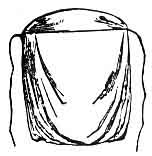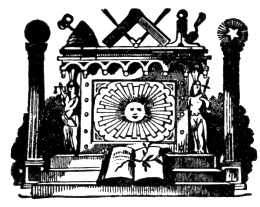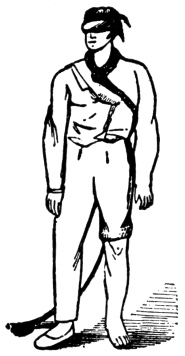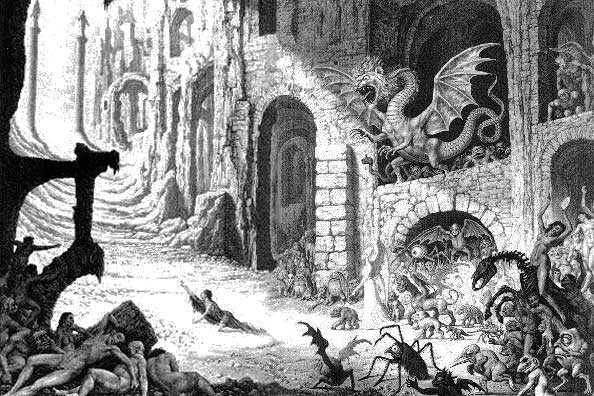W. M.–Brother, I now present you with a lambskin or white
 ENTERED APPRENTICE’S APRON. ENTERED APPRENTICE’S APRON. |
apron, which is an emblem of innocence and the badge of a Mason, more ancient than the Golden Fleece or Roman Eagle, and, when worthily worn, more honorable than the Star and Garter, or any other order that can be conferred on you at this time, or any future period, by kings, princes, and potentates, or any other persons, except it be by Masons. I trust that you will wear it with equal pleasure to yourself and honor to the fraternity. You will carry it to the Senior Warden in the west, who will teach you how to wear it as an Entered Apprentice.
Deacon conducts candidate back to the west, and says:
S. D.–Brother Senior Warden, it is the order of the Worshipful Master, that you teach this new-made brother how to wear his apron as an Entered Apprentice.
The Senior Warden takes the apron and ties it on the candidate, with the flap turned up, remarking to the candidate as he does so: This is the way, Brother Gabe, that Entered Apprentices wore their aprons at the building of King Solomon’s Temple, and so you will wear yours until further advanced. Senior Deacon now reconducts the candidate to the Worshipful Master in the east.
p. 40
W. M.–Brother Gabe, agreeably to an ancient custom, adopted among Masons, it is necessary that you should be requested to deposit something of a metallic kind or nature, not for its intrinsic valuation, but that it may be laid up among the relics in the archives of this Lodge, as a memento that you were herein made a Mason. Anything, brother that you may have about you, of a metallic nature, will be thankfully received–a button, pin, five or ten cent piece–anything, my brother.
Candidate feels for something–becomes quite confused. On examination, or reflection, finds himself very destitute, not being able to contribute one pin, his conductor having been careful to take every thing from him, in the ante-room, before he entered the Lodge;–finally stammers out that he has nothing of the kind with him, but if permitted to pass out into the ante-room, where his clothes are, he will contribute. This the Master refuses to do, of course, which only helps confuse the candidate more and more. After the Master has kept the candidate in this suspense some moments, he says:
W. M.–Brother Gabe, you are indeed an object of charity–almost naked, not one cent, no, not even a button or pin to bestow on this Lodge. Let this ever have, my brother, a lasting effect on your mind and conscience; and remember, should you ever see a friend, but more especially a brother, in a like destitute condition, you will contribute as liberally to his support and relief as his necessities may seem to demand and your ability permit, without any material injury to yourself or family.1
W. M.–Brother Senior Deacon, you will now reconduct this candidate to the place from whence he came, and reinvest him with that which he has been divested of, and return him to the Lodge for further instruction.
Senior Deacon takes candidate by the arm, leads him to the centre of the Lodge, at the altar before the Worshipful Master in the east, makes duegard and sign of an Entered Apprentice, and then retires to the ante-room.
After candidate is clothed, the deacon ties on his apron, and, returning to the Lodge, conducts him to the Worshipful Master in the east, who orders the Deacon to place him in the northeast corner of the Lodge, which is at the Master’s right.
W. M.–Brother Gabe, you now stand in the northeast corner of this Lodge, as the youngest Entered Apprentice, an upright man and Mason, and I give it to you strictly in charge as such ever to walk and act. (Some Masters preach great sermons to candidate on this occasion.) Brother, as you are clothed as an
p. 41

Moe is the founder of GnosticWarrior.com. He is a father, husband, author, martial arts black belt, and an expert in Gnosticism, the occult, and esotericism.






